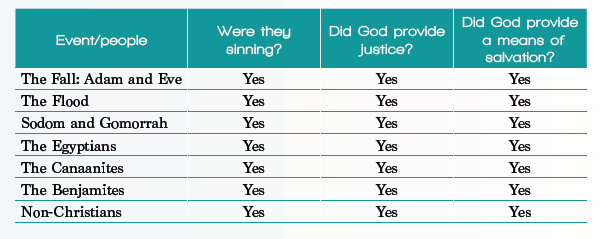BIBLE REF.
Genesis 6:3, 6:5
Jeremiah 18:7–8
Ezekiel 18:4
Jonah 3
Matthew 19:17
Romans 3:10–12, 23
Romans 1:18–32
Attempting to disprove the existence of the biblical God by attacking His morality is quite popular today. The fantastic irony is that without the God of Scripture — the standard and definition of goodness — there is no absolute standard for morality by which to morally judge anyone. From the start, the secularist is caught in a vicious catch-22.
One of the more popular forms of this is to accuse God of injustice by commanding the destruction of so-called innocent peoples. “How could God command Israel to destroy the Canaanites? Or what about killing everyone on earth with a flood? He’s an unfair, genocidal bully!”
How does the Christian respond? First, no one is innocent. All have sinned, all fall short of God’s perfect standard, none seek after God (Matthew 19:17; Romans 3:10–12, 23). Only those who had sinned died (Ezekiel 18:4). Many people ask, “Why does God let (or cause) bad things to happen to good people?” Well, that only happened once. It was Jesus, who was without sin, who volunteered.
Not only are none innocent, but the depravity of those destroyed was so obscene that if any sane person could see their acts on
the news today, they would likely demand intervention. The Bible records that the wickedness of the pre-Flood people was to the point that all of their thoughts and desires were only evil all the time (Genesis 6:5). The Canaanites that God ordered Israel to eradicate practiced severe brutality, incest, idolatry, homosexuality, bestiality, cultic prostitution, and grotesque child sacrifice. And lest one think God was showing partiality, He warned Israel He would similarly judge them if they emulated the Canaanites.
God’s decree against the Canaanites, pre-Flood people, and other similar cases wasn’t cruel or vindictive. Rather, their evil was so oppressive and cancerous that the only option was complete removal. Like a doctor who removes a cancer to save the body, the gangrenous wickedness of those utterly depraved must be removed. Not to do so would doom Israel and other surrounding nations to suffer a slow death.
There was also plenty of time to repent before judgment fell (Genesis 6:3). The consistent pattern in Scripture is when a nation repents, God withholds judgment (Jeremiah 18:7–8; Jonah 3). Those under the threat of judgment knew what God required and that judgment was coming (2 Peter 2:5). Yet they willfully refused to save themselves, their families, or other loved ones by submitting to God and repenting of sin.
Really, arguments like these are just another excuse to suppress the truth (Romans 1:18–32). What the judgments of God in the Bible actually show are God’s incredible patience, mercy, love, common grace, sovereignty, righteousness, and holiness. All of this points to the eternal reality that as a just judge, God will judge all sin without fail. And just as the Ark was the only means of rescue before the Flood, repentance and faith in Christ is the only means of deliverance from the coming eternal judgment (2 Peter 3:9; 1 Peter 3:18).
 Loading Page...
Loading Page...



